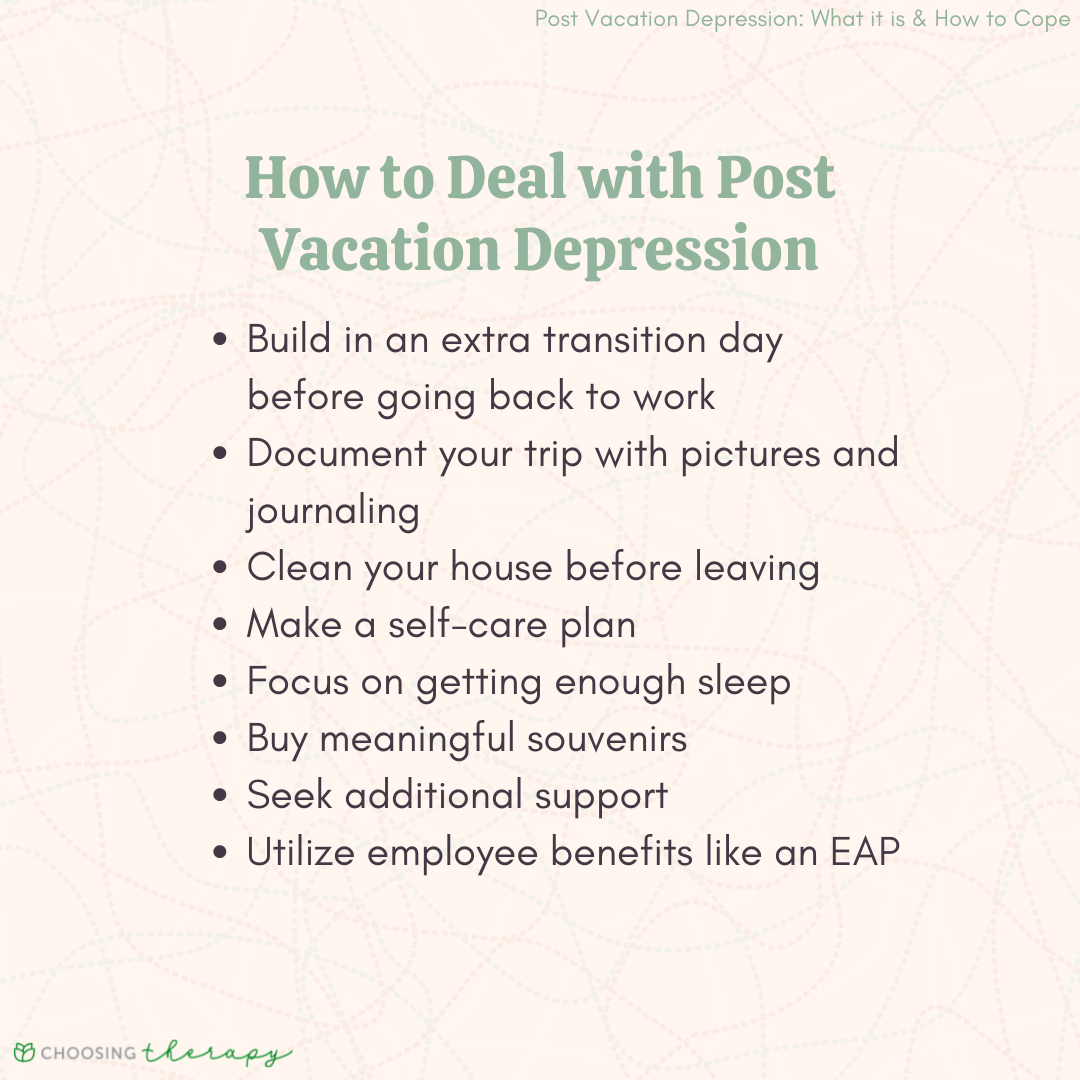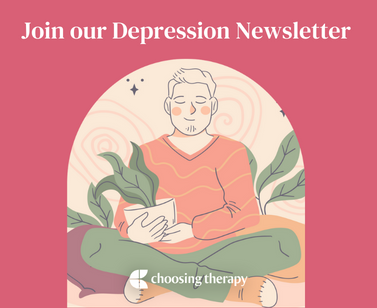Post vacation depression, while not a clinical term, is defined by three days to two weeks after a vacation in which someone experiences varied symptoms of depression. You may feel a sense of relief to have made it home safely, but still have concurrent feelings of grief because life will return to your usual routine. While you won’t always be able to avoid post vacation depression, you can manage it in healthy ways.1
Depression Is Treatable With Therapy Would you like to feel more happiness and joy? BetterHelp has over 20,000 licensed therapists who provide convenient and affordable online therapy. BetterHelp starts at $65 per week. Take a Free Online Assessment and get matched with the right therapist for you.
What Is Depression?
Clinical depression or major depressive disorder (MDD) is a serious mood disorder marked by an intense and persistent low mood and loss of interest in pleasurable activities for most of nearly every day for at least two weeks. Symptoms of depression can vary in severity and intensity depending on the person, but MDD is generally a debilitating mental health condition that interferes with a person’s ability to function and handle everyday tasks.2
Some common symptoms of depression include:2
- Feelings of sadness, helplessness, and/or emptiness
- Disinterest in activities that used to be enjoyable
- Changes in appetite resulting in weight loss or weight gain
- Problems with sleep
- Lack of energy
- Feeling irritable
- Trouble concentrating
- Body aches, headaches, or digestive issues
- Suicidal thoughts
What Is Post Vacation Depression?
Post-vacation depression, or post-vacation syndrome, can be understood as an emotional state after vacations and holiday breaks in which a person struggles to get back to their everyday life. Post-vacation syndrome is not an official disorder, but someone can experience depressed mood, distress, insomnia, irritability, and fatigue after a vacation. Basically, the return to the home environment and/or the re-direction of life after periods of leisure (time off work, holidays, traveling etc.) can cause distress in some people.3
Symptoms of Post Vacation Blues
Experiencing post-vacation depression (sometimes called post vacation blues, or post-holiday blues) can be difficult. You may find yourself daydreaming about your vacation, obsessively scrolling through the pictures, or impulsively looking up flights to book your next getaway. It can be easy to equate vacations with peace, rejuvenation, and an escape from responsibility.
Symptoms of post vacation depression can include:
- Being easily irritated or upset
- Difficulty concentrating or focusing
- Trouble sleeping
- Obsessively looking for your next vacation
- Intense feelings of sadness
- Work depression
- Lack of motivation
- Mental exhaustion
- Work anxiety
Why Do I Feel Depressed After Vacation?
Returning to your source of stress whether it’s home, work, or school, can feel depressing and also increase feelings of anxiety.4 Post-vacation depression can be an indication that you need more tools to healthily manage stress in your daily life.
Help For Depression BetterHelp – Get help from a licensed therapist. BetterHelp offers convenient and affordable online therapy starting at $65 per week. Free Assessment Talkspace – Online Therapy With Or Without Insurance. Talkspace accepts many insurance plans including Optum, Cigna, and Aetna. Typical co-pay is $30, but often less. Get started
How to Prevent Post Vacation Depression: 18 Tips
After vacation, when you have no motivation, depression can become difficult to deal with; however, there are healthy ways to manage symptoms. These methods include building a transition period into your return to “real life,” documenting your trip with photos or a journal, cleaning your house before you leave, and making a self-care plan in advance.
Here are 18 tips for how to get out of a funk related to post vacation blues:
1. Build In an Extra Transition Day Before Going Back to Work
Travel can be unpredictable and you never know when there will be an unexpected delay. Consider giving yourself an extra day of “vacation” at home so you can rest and catch up on any tasks you need to do before returning to work.
2. Document Your Trip With Pictures & Journaling
Consider getting a photo album and printing out the pictures from your trip. Creating a scrapbook of your memories can be comforting and soothing, too.6 You’ll be able to revisit your happy vacation memories in future.
3. Clean Your House Before Leaving
It’s hard coming home from vacation but it’s even harder coming home to a list of household tasks to complete. Coming back to a clean house can give you a sense of peace.7 Make the extra effort to do some housekeeping before you leave so you can rest and relax when you arrive home.
4. Make a Self-Care Plan
The benefits of self-care are immense, so take a few minutes to plan activities or practices you can implement during the week you return from vacation. A relaxing bath, warm beverage, or a good book can help you manage exhaustion and post vacation depression.8
5. Focus On Getting Enough Sleep
It’s easy to downplay the importance of sleep, but it’s challenging to be productive when you don’t feel well rested. Practice giving yourself an 8-hour window to create a restful environment and wind down to sleep.
6. Buy Meaningful Souvenirs
When you’re on vacation, consider bringing something memorable home. It may not be expensive, but it should remind you of the experience.9,10 For example, ornaments, magnets, and coffee mugs are great souvenirs that don’t take up a lot of luggage space.
7. Seek Additional Support
Schedule time to catch up with a friend or reach out to someone you haven’t talked to in a while. Having social support can be beneficial for your mental and physical health.5 Also, consider talking to a prescriber about the possibility of taking medication if your symptoms last longer than six weeks.
Depression Is Treatable With Therapy Would you like to feel more happiness and joy? BetterHelp has over 20,000 licensed therapists who provide convenient and affordable online therapy. BetterHelp starts at $65 per week. Take a Free Online Assessment and get matched with the right therapist for you.
8. Utilize Employee Benefits Like an EAP
Many full-time positions offer some type of Employee Assistance Program (EAP). This gives you the opportunity to talk to a licensed mental health therapist for 3 to 6 solution-focused therapeutic sessions.11 Contact your human resources department to find out about the process of getting a referral.
9. Validate Your Emotions
Manage your internal dialogue and practice some self-compassion if you’re feeling depressed after vacation. Give yourself some encouragement, too.12 The change of pace from being on vacation to being confronted with the stresses of your daily life can be difficult. Give yourself permission to feel.
10. Practice Mindfulness
Starting a meditation practice and incorporating grounding techniques into your daily routine can be a healthy way to manage stress.13 Additionally, it can help bring you back to the present moment and improve your focus and concentration.
11. Take PTO Days
You may be experiencing post vacation blues because you feel burned out. Consider taking time off from work more frequently.14 Take an extended weekend every other month or tack on an extra day or two to a holiday week.
12. Use Time Blocks
Create a plan for what you want to accomplish and set time aside to complete the tasks you can’t avoid. Prioritize the most important things and accomplish those tasks first.
13. Create a Vacation Fund
Consider putting aside a certain percentage of your income into a savings account specifically for vacation. While it doesn’t need to be a large amount, the funds will add up if you don’t give yourself easy access to the account.15 Ideally it needs to be an automatic transfer so you’re not thinking about the money you’re “missing.”
14. Plan Ahead for the Future
Think about how many days you want to take off in a year and use a calendar to plan it all out. If major holidays are the most important, schedule your time off around them. If you prefer traveling at non-peak times, pick some weekends or days that work for your schedule.
15. Take Inventory of Your Goals
Reflect on what traveling means to you and how it contributes to your emotional well-being. Maybe it’s time to dedicate more time and resources towards an activity that genuinely brings you joy and fulfillment.
16. Focus on the Small Things
Consider adding an activity or outing during your vacation that is more service oriented. Volunteer your time or services to a non-profit organization that has a cause you believe in.16 This can provide a healthy perspective on some of the positive aspects of your life.
17. Create a Ritual
Create an activity around returning home from vacation that makes you feel good.16 Whether you create a special meal or add vacation pictures to a scrapbook, it gives you a tradition to remember the time that you had on vacation.17
18. Disrupt Your Routine
Regardless of what you did on your vacation, it certainly broke your routine. Now, as you acclimate back to your everyday life, you find it boring and feel unmotivated. One way to bring a little excitement into your regular life is by disrupting your routine in subtle ways. For example, consider taking up a new hobby, planning a mini-trip, going to new places in your area, or anything else that can give you a sense of joy and something to look forward to.
What to Do if Post Depression Blues Linger
If you can’t seem to shake your post vacation depression, don’t hesitate to seek professional help. It may be a sign of a larger mental health issue. If you don’t know where to start, consider finding a therapist in an online directory. They can help you reflect on and cope with feelings of sadness.
Final Thoughts On Post Vacation Depression
If you experience post-vacation depression, it doesn’t mean that something’s wrong with you. Exploring what helps you manage it in a healthy way can mean the difference between going into a deeper depression or adjusting back into your normal routine.
Additional Resources
To help our readers take the next step in their mental health journey, Choosing Therapy has partnered with leaders in mental health and wellness. Choosing Therapy is compensated for marketing by the companies included below.
Talk Therapy
Online-Therapy.com – Get support and guidance from a licensed therapist. Online-Therapy.com provides 45 minute weekly video sessions and unlimited text messaging with your therapist for only $64/week. Get Started
Online Psychiatry
Hims / Hers If you’re living with anxiety or depression, finding the right medication match may make all the difference. Connect with a licensed healthcare provider in just 12 – 48 hours. Explore FDA-approved treatment options and get free shipping, if prescribed. No insurance required. Get Started
Depression Newsletter
A free newsletter from Choosing Therapy for those impacted by depression. Get helpful tips and the latest information. Sign Up
Learn Anti-Stress & Relaxation Techniques
Mindfulness.com – Change your life by practicing mindfulness. In a few minutes a day, you can start developing mindfulness and meditation skills. Free Trial
Choosing Therapy Directory
You can search for therapists by specialty, experience, insurance, or price, and location. Find a therapist today.
Online Depression Test A few questions from Talkiatry can help you understand your symptoms and give you a recommendation for what to do next. Best Online Psychiatry Services Online psychiatry, sometimes called telepsychiatry, platforms offer medication management by phone, video, or secure messaging for a variety of mental health conditions. In some cases, online psychiatry may be more affordable than seeing an in-person provider. Mental health treatment has expanded to include many online psychiatry and therapy services. With so many choices, it can feel overwhelming to find the one that is right for you.








